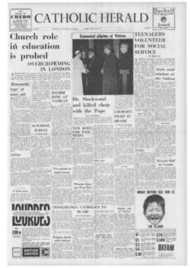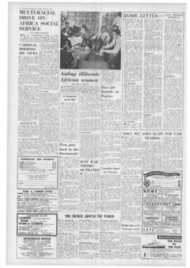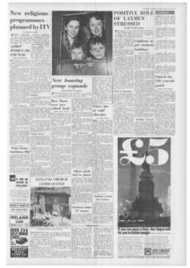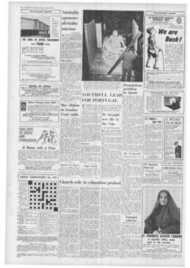Page 1, 10th April 1964
Page 1

Report an error
Noticed an error on this page?If you've noticed an error in this article please click here to report it.
Tags
Share
Related articles
Don't Impose Beliefs •
Irish Church Accuses Government Of Belittling Its Role In...
Religious Instruction In Schools Opposite Schools Of...
First Principal For College
Opt Into Schools' Future
Church role if' education is probed
OVERCROWDING IN LONDON
ASEARCHING reassessment of the Church's role in Britain's Secondary Education has been made in London this week. More than 250 of our top educational "brains" tomorrow (Saturday) end a four-day session during which they have put the whole system under the microscope.
The conference, arranged by the Catholic Teachers' Federation, reviewed the manner in which 11-plus students are selected and accommodated in secondary schools; the standards of religious instruction and practice in these schools; the work of the Catholic teacher training colleges,and the opportunities for the further religious education of the teachers.
Four reports on these subjects were submitted to the conference for discussion. A full report will be given in next week's CATHOLIC HERALD.
Archbishop Beck of Liverpool, Chairman of the Catholic rducation Council, told the conference that Catholics could "reasonably hope" for an extension of State aid for new school buildings of all kinds but even so the cost to the community was likely to be "very heavy".
46-SCHOOL SURVEY
by Marian Curd
SCHOOL heads, Diocesan Education Commissioners, Religious Inspectors, Chaplains, and Training College lecturers met for four days this week at St. Mary's Training College, Strawberry Hill, to submit Catholic Secondary Education to a searching analysis.
Heading the experts is Archbishop Beck. Chairman of the Catholic Education Council. With him are Archbishop Heenan of Westminster, other members of the Hierarchy, and Britain's Apostolic Delegate. Archbishop Cardinale.
The discussions have been centred mainly round a survey of Catholic Education between 1914 and 1%4 based on returns from 46 schools, with 22,000 children, in London and Middlesex, and a few in Birmingham and Birkenhead.
The survey showed: 1. Forms with more than 30 pupils are in the majority. About half the 700 forms involved had 3035 pupils; nine had over 40.
2. London schools are the most heavily crowded. Of 10 Grammar Schools questioned. eight had to refuse a total of 264 applicants. Non-Grammar secondary schools are equally badly off. Last year 798 11-plus London children could not get entry. But schools in Wallasey, Birkephead and Birmingham were able to take all applicants.
3. Applicants are often refused because they have not been to Catholic Primary Schools. Head teachers, considering applications, pay special attention to religious practice, distance from school. academic ability. family connections. 11-plus results and interviews.
One Secondary Modern Head in Essex wrote: "The Parish Priests
DANISH KING AT VATICAN
COPENHAGEN
!TING FREDERICK IX of Den
mark is to visit Pope Paul VI on April 23. This will be the first time a Danish monarch has paid an official visit to the State of Vatican City, but not the first time since the Reformation that a Danish king has visited a Pope.
The present king's father, King Christian X, paid an official visit to Pope Benedict XV in 1920, fore the existing Vatican City State was established. The King was touring European capitals to thank the allied victors of World War I for the restoration to Denmark of South Jutland.
At that time, the Church was involved in its dispute with the Italian Government, and the Pope's policy was to avoid receiving heads of state if they had previously visited King Victor Emmanuel III at the Quirinalc.
King Christian put on dress uniform and left for the Vatican from his own Embassy. which was Danish. not Italian, territory. On the way. he stopped with the Queen to visit an altar dedicated to Denmark's patron, St. Knud, in the Church of Santa Maria in Transpontina, They laid flowers on the altar and made a gift of a confessional.
The visit set off a storm of criticism in Denmark, but resulted in close ties of friendship between the Holy See and the Royal Family. The King attended a Requiem for Pope Benedict in St. Ansgar's Cathedral, Copenhagen, and last year, when Pope John died. Requiem Masses and Catholic memorial services in Denmark were attended by the present King, members of the Government, and Lutheran bishops.
blog comments powered by Disqus











